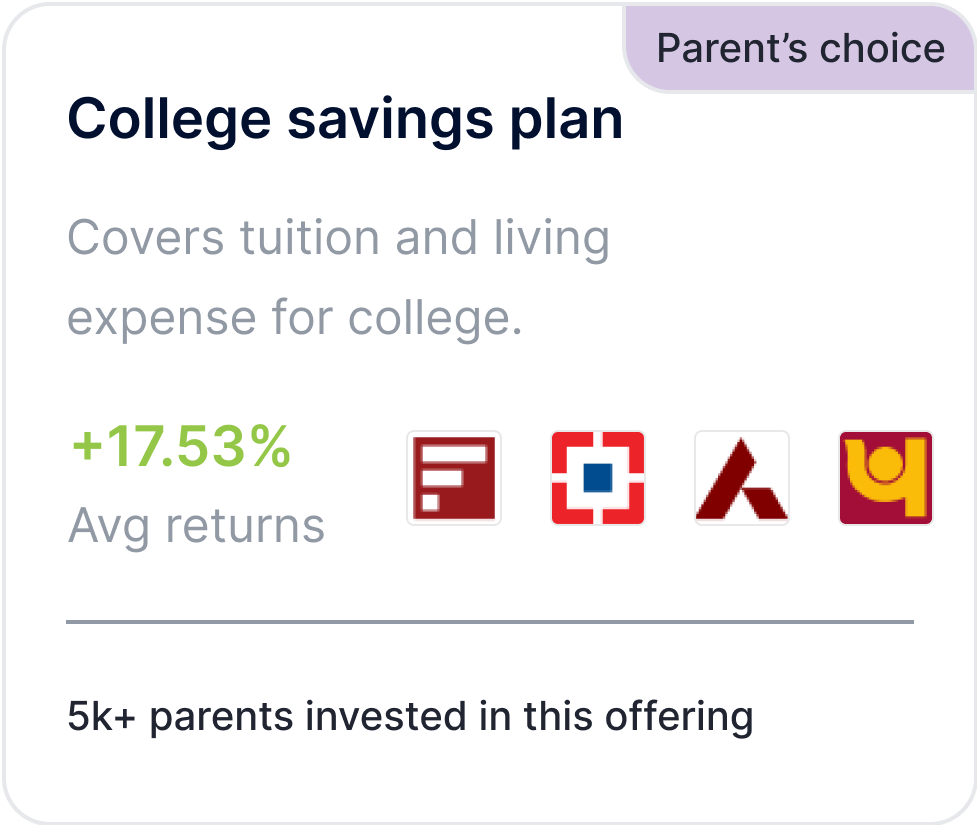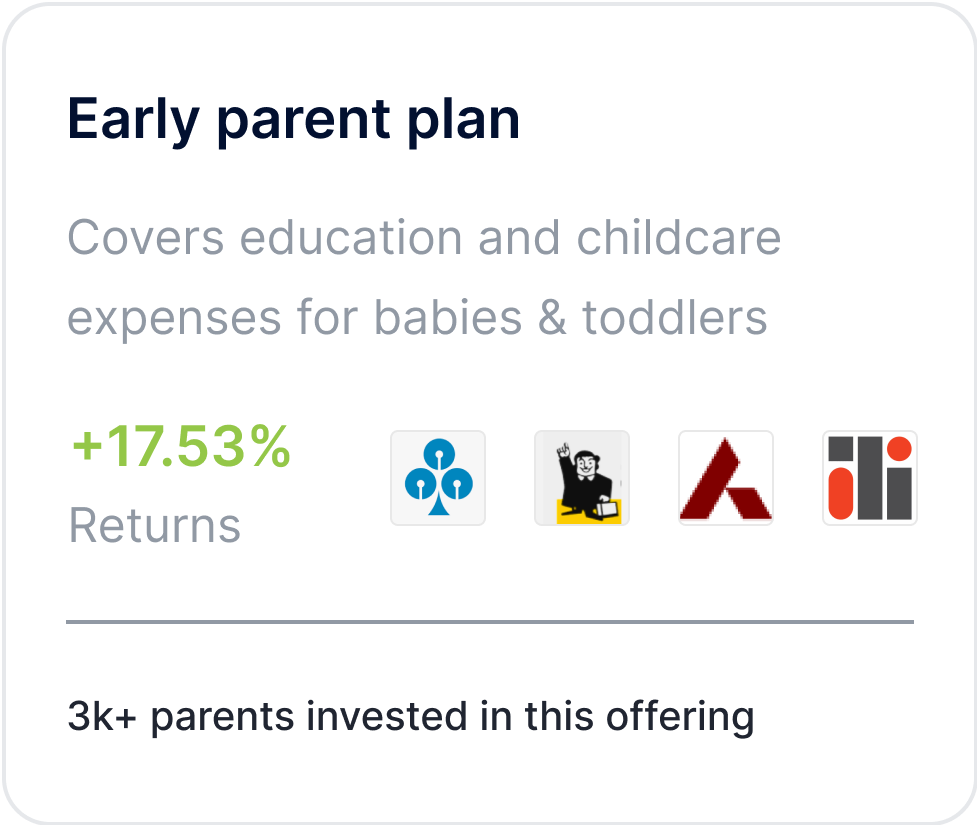Send Your Child to Their Dream College
With Mutual Fund Investments
Rs. 5,000 a month can grow to 12 lakhs in 10 years
Beat the rising cost of education. Take advantage of the power of compounding with SIPs.
Returns assuming an SIP of Rs. 5,000 in Nifty 50.
(Disclaimer: Mutual Fund investments are subject to market risks. Read all scheme related documents carefully. Past performance does not guarantee future returns)
EduFund Offers Over
5,000 Best-Performing Mutual Funds







How much you can earn for your child's future by investing early?
Frequently Asked Questions
What is a mutual fund?
A mutual fund is an investment vehicle that pools money from multiple investors to invest in a diversified portfolio of stocks, bonds, or other securities, managed by professional fund managers.
Are mutual funds risk-free?
No, mutual funds are not risk-free. The level of risk varies depending on the type of fund and the underlying assets. Equity funds generally carry higher risks compared to debt funds
How is the Net Asset Value (NAV) calculated?
NAV is calculated by dividing the total value of the fund’s assets minus liabilities by the total number of outstanding units. It is updated daily based on the market value of the securities held.
What are the different types of mutual funds?
Mutual funds can be categorized into various types, including equity funds, debt funds, hybrid funds, index funds, and sector-specific funds, each serving different investment objectives.
What is a Systematic Investment Plan (SIP)?
A SIP is a disciplined way of investing in mutual funds, allowing investors to contribute a fixed amount regularly (monthly or quarterly) instead of making a lump-sum investment.
Can Non-Resident Indians (NRIs) invest in mutual funds?
Yes, NRIs can invest in mutual funds in India, subject to certain regulations and documentation requirements. You should also consult your CA before investing.
What is an exit load?
An exit load is a fee charged by mutual funds when investors redeem their units before a specified period. It is designed to discourage short-term trading.
How can I track the performance of my mutual fund investments?
You can track the performance of your mutual fund investments through the fund’s website, investment statements, or financial platforms that provide updates on NAV and fund performance.
What happens if a mutual fund scheme is wound up?
If a mutual fund scheme is wound up, the investors are entitled to receive their share of the remaining assets based on the prevailing NAV after deducting any expenses.
How do I invest in a mutual fund?
You can invest in mutual funds using the EduFund app, simply download the app, complete your KYC, and start investing in over 4,000 funds that align with your financial goals. You can start investing with just ₹100 monthly in Indian mutual funds via SIP. Digital Gold allows investments as low as ₹10, while Fixed Deposits typically start at ₹5,000.
What is the difference between direct and regular plans?
Direct plans have lower expense ratios compared to regular plans, as they do not involve any commission payments to distributors or brokers. Direct plans are suitable for investors who can manage their investments directly.
What is the difference between growth and IDCW?
In the growth option, the fund’s earnings are reinvested, leading to an increase in the NAV. In the IDCW, the fund distributes its earnings to investors periodically, reducing the NAV accordingly.
How do I choose the right mutual fund?
When choosing a mutual fund, consider factors such as your investment goals, risk tolerance, investment horizon, and the fund’s performance, expense ratio, and portfolio composition.
What is the minimum investment amount in mutual funds?
The minimum investment amount varies across fund houses and schemes. Most equity and debt funds have a minimum investment of ₹500 for lump-sum investments and ₹100 for SIPs.
How do I redeem my mutual fund units?
To redeem your mutual fund units, you can submit a redemption request to the fund house or through your investment platform. The redemption proceeds are typically credited to your bank account within 3-4 business days.
What is a mutual fund?
A mutual fund is an investment vehicle that pools money from multiple investors to invest in a diversified portfolio of stocks, bonds, or other securities, managed by professional fund managers.
Are mutual funds risk-free?
No, mutual funds are not risk-free. The level of risk varies depending on the type of fund and the underlying assets. Equity funds generally carry higher risks compared to debt funds
How is the Net Asset Value (NAV) calculated?
NAV is calculated by dividing the total value of the fund’s assets minus liabilities by the total number of outstanding units. It is updated daily based on the market value of the securities held.
What are the different types of mutual funds?
Mutual funds can be categorized into various types, including equity funds, debt funds, hybrid funds, index funds, and sector-specific funds, each serving different investment objectives.
What is a Systematic Investment Plan (SIP)?
A SIP is a disciplined way of investing in mutual funds, allowing investors to contribute a fixed amount regularly (monthly or quarterly) instead of making a lump-sum investment.
Can Non-Resident Indians (NRIs) invest in mutual funds?
Yes, NRIs can invest in mutual funds in India, subject to certain regulations and documentation requirements. You should also consult your CA before investing.
What is an exit load?
An exit load is a fee charged by mutual funds when investors redeem their units before a specified period. It is designed to discourage short-term trading.
How can I track the performance of my mutual fund investments?
You can track the performance of your mutual fund investments through the fund’s website, investment statements, or financial platforms that provide updates on NAV and fund performance.
What happens if a mutual fund scheme is wound up?
If a mutual fund scheme is wound up, the investors are entitled to receive their share of the remaining assets based on the prevailing NAV after deducting any expenses.
How do I invest in a mutual fund?
You can invest in mutual funds using the EduFund app, simply download the app, complete your KYC, and start investing in over 4,000 funds that align with your financial goals. You can start investing with just ₹100 monthly in Indian mutual funds via SIP. Digital Gold allows investments as low as ₹10, while Fixed Deposits typically start at ₹5,000.
What is the difference between direct and regular plans?
Direct plans have lower expense ratios compared to regular plans, as they do not involve any commission payments to distributors or brokers. Direct plans are suitable for investors who can manage their investments directly.
What is the difference between growth and IDCW?
In the growth option, the fund’s earnings are reinvested, leading to an increase in the NAV. In the IDCW, the fund distributes its earnings to investors periodically, reducing the NAV accordingly.
How do I choose the right mutual fund?
When choosing a mutual fund, consider factors such as your investment goals, risk tolerance, investment horizon, and the fund’s performance, expense ratio, and portfolio composition.
What is the minimum investment amount in mutual funds?
The minimum investment amount varies across fund houses and schemes. Most equity and debt funds have a minimum investment of ₹500 for lump-sum investments and ₹100 for SIPs.
How do I redeem my mutual fund units?
To redeem your mutual fund units, you can submit a redemption request to the fund house or through your investment platform. The redemption proceeds are typically credited to your bank account within 3-4 business days.



